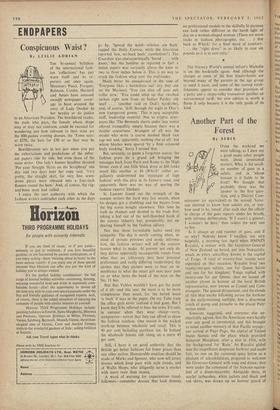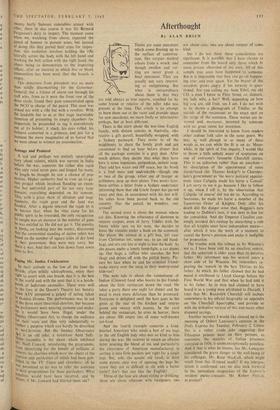Another Part of the Forest
By STRIX Is it always an odd number of guns, and if so why? Nobody knew. I recalled, not very helpfully, a morning last April when HMNZS Royalist, a cruiser with the Governor-General of New Zealand on board, put into Nukualofa, which as every schoolboy knows is the capital of Tonga. A total of seventy-four rounds were expended on that occasion, Royalist fired two twenty-one-gun salutes, one for Queen Salote and one for her kingdom; Tonga replied with twenty-one for our Queen; then we loosed off another eleven in honour of the local British representative, now known as Consul and Com- missioner. The spaced detonations, and the clouds of thin blue smoke billowing across the harbour in the early-morning sunlight, lent a disarming touch of pomp and panache to the placid Poly- nesian scene.
Someone suggested, and everyone else un- charitably agreed, that the Americans were hardly ever any good at ceremonial, and this brought to mind another memory of that Pacific voyage: our arrival at Pago Pago, the capital of United States Samoa and the place which provided Somerset Maugham, after a visit in 1916, with the background for 'Rain.' As Royalist glided into' the magnificent deepwater harbour and made fast, we saw on the rainswept quay below us a phalanx of schoolchildren, prepared to welcome the Governor-General with song and dance; they were under the command of the Samoan equiva- lent of a drum-majorette. Alongside them, in scarlet tarbooshes, white jackets and black and red skirts, was drawn up an honour guard of twenty burly Samoan constables armed with rifles; these in due course it was Sir Bernard Fergusson's duty to inspect. The moment came when we, watching from above, expected the guard of honour to present arms, but instead of doing this they ported their arms for inspec- tion; this evolution involves holding the rifle laterally across the body with the left hand and working the bolt action with the right hand, the object being to demonstrate to the inspecting officer, after an exercise in which live or blank ammunition has been used, that the breech is empty.
This departure from precedent was no more than mildly disconcerting for the Governor- General; but a frisson of alarm ran through his staff who, from as it were the front row of the dress circle, found their gaze concentrated upon the NCO in charge of the guard. This man was armed not with a rifle but with a revolver. With the laudable but to us at that stage inscrutable intention of presenting its empty chambers for inspection, he proceeded to tug it convulsively out of iits holster; it stuck, his eyes rolled, his features contorted in a grimace, and just for a Moment the more imaginative of us feared that we were about to witness an assassination.
Acreage and Protocol
A sad and perhaps not entirely apocryphal story about salutes, which was current in India before the war, concerns the rather dim rajah Who only rated seven guns and longed for more. At length he thought he saw a chance of pro- motion. Higher authority had in view an irriga- tion project which involved flooding an exten- stye but unfruitful part of his not very large domain; everything depended on his consent. This, with a great show of altruism and mag- nanimity, the rajah gave and the land Was flooded. After a dspent interval the rajah let it be known that, when the time came for his Public spirit to be rewarded, the only recognition he sought was an increase in the number of guns he Was entitled to. He did not get it. The pundits In Simla, on looking into the matter, discovered that the ceremonial standing of native rulers was b ascd on the number of square miles of dry land In their possession; they were very sorry, but there it was. And they cut him down from seven guns to five.
Paging Mr, Justice Cockiecarrot British, In their attitude to the law of the land the '3itish, often mildly schizophrenic, enjoy their t,I8hf to assert with one breath that it is the best In the world and with the next that it is a hotch- potch of ludicrous anomalies. These were well to the fore at the Queen's Theatre last Sunday When ATV presented a galaxy of acting talent ill Golden Drama. The performance was in aid of the three main theatrical charities, but because the performers were wearing costume and make- 4P it would have been illegal, under the fonclay Observance Act, to charge the audience or their seats and thus very substantially to further a purpose which can hardly be described as un-Christian. But the Sunday Observance '',et is an old joke, a notorious Aunt Sally. More recondite is the ukase which inhibited 1:4r. Noel Coward, introducing the programme. runt identifying for the benefit of millions of viewers the charities which were the object of the ci.Xereise and particulars of which had been pub- fished in the TV Times and elsewhere; all he ,‘vas Permitted to do was to' refer the audience `° their programmes for these particulars. What Penalties would have been incurred, and by whom, if Mr. Coward had blurted them out?



































 Previous page
Previous page